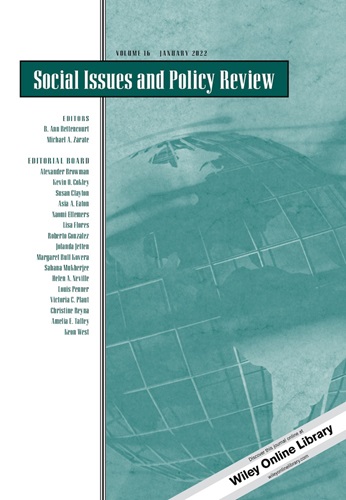Understanding (and Reducing) Inaction on Climate Change
IF 5.6
1区 心理学
Q1 PSYCHOLOGY, SOCIAL
引用次数: 102
Abstract
For over 50 years, scientists have sounded alarms that the burning of fossil fuels is causing changes to the Earth's climate, and that failure to take action on climate change will have devastating consequences. Despite this urgency, CO2 emissions (and global temperatures) continue to climb. Progress on mitigating climate change is slowed by the stubborn persistence of climate skepticism, as well as a failure for nonskeptics to translate their concern about climate change into meaningful action. The goal of this article is to describe and synthesize research on how to understand (and reduce) this public inaction on climate change. In the first half of the article, we examine the question of how to understand (and overcome) climate change skepticism. We review international evidence regarding the role of demographics, ideologies, and conspiracist worldviews in shaping people's willingness to believe in the reality of human-caused climate change. We then review theory and research on how to successfully capture the attention of—and change the behavior of—people who traditionally resist climate change messages, such as those high in conservatism and free-market beliefs. In the second half of the article, we examine how to promote more climate-friendly behaviors among people who believe in the reality of climate change. Evidence will be reviewed suggesting that many people agree that climate change is caused by humans, but are not yet willing to make the necessary investments and sacrifices to respond to this threat. We then draw on relevant literatures to critically discuss three strategies for promoting proenvironmental behavior: (i) optimistic versus pessimistic messages; (ii) in-group versus out-group messenger effects; and (c) the use of descriptive and injunctive norms.理解(并减少)对气候变化的不作为
50多年来,科学家们一直在发出警告,化石燃料的燃烧正在导致地球气候的变化,不采取行动应对气候变化将带来毁灭性的后果。尽管形势紧迫,但二氧化碳排放量(和全球气温)仍在继续攀升。气候怀疑论者的顽固坚持,以及非怀疑论者未能将他们对气候变化的担忧转化为有意义的行动,阻碍了减缓气候变化的进展。本文的目的是描述和综合研究如何理解(和减少)公众对气候变化的不作为。在文章的前半部分,我们研究了如何理解(并克服)气候变化怀疑论的问题。我们回顾了有关人口统计、意识形态和阴谋论世界观在塑造人们愿意相信人类造成的气候变化现实中的作用的国际证据。然后,我们回顾了有关如何成功吸引那些传统上抵制气候变化信息的人的注意力(并改变他们的行为)的理论和研究,比如那些高度保守主义和自由市场信仰的人。在文章的后半部分,我们研究了如何在相信气候变化现实的人们中促进更多的气候友好行为。将审查的证据表明,许多人同意气候变化是由人类造成的,但尚未愿意做出必要的投资和牺牲来应对这一威胁。然后,我们借鉴相关文献批判性地讨论了促进亲环境行为的三种策略:(i)乐观与悲观的信息;(ii)群体内与群体外的信使效应;(c)描述性和禁令性规范的使用。
本文章由计算机程序翻译,如有差异,请以英文原文为准。
求助全文
约1分钟内获得全文
求助全文
来源期刊

Social Issues and Policy Review
Multiple-
CiteScore
22.20
自引率
1.10%
发文量
9
期刊介绍:
The mission of Social Issues and Policy Review (SIPR) is to provide state of the art and timely theoretical and empirical reviews of topics and programs of research that are directly relevant to understanding and addressing social issues and public policy.Papers will be accessible and relevant to a broad audience and will normally be based on a program of research. Works in SIPR will represent perspectives directly relevant to the psychological study of social issues and public policy. Contributions are expected to be review papers that present a strong scholarly foundation and consider how research and theory can inform social issues and policy or articulate the implication of social issues and public policy for theory and research.
 求助内容:
求助内容: 应助结果提醒方式:
应助结果提醒方式:


